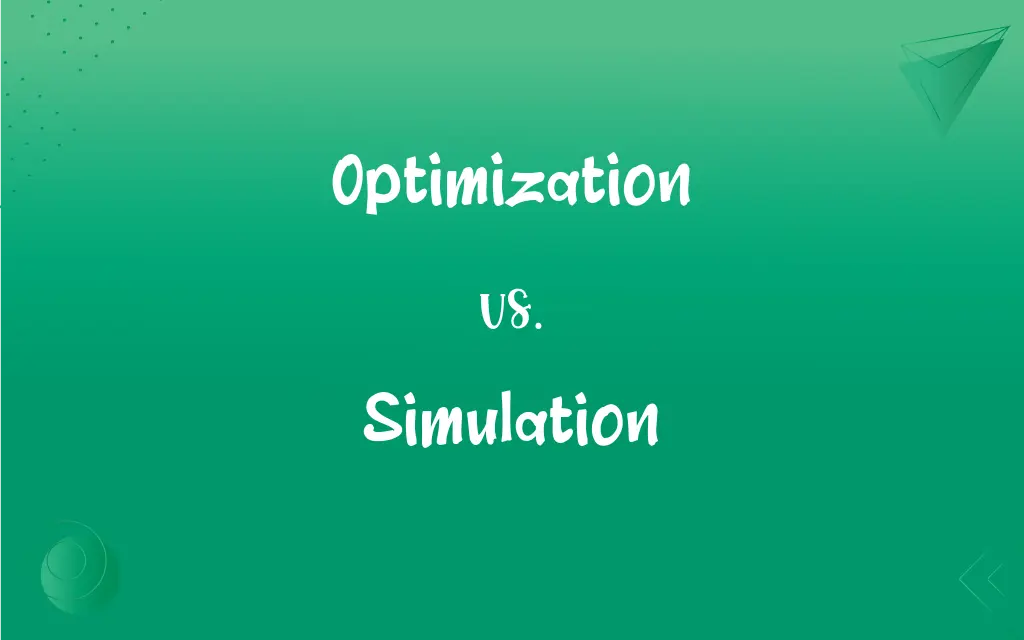Optimization vs. Simulation: What's the Difference?
Edited by Aimie Carlson || By Janet White || Updated on September 28, 2023
Optimization is the process of making something as effective or functional as possible, whereas simulation is the imitation of the operation of a real-world process or system.

Key Differences
Optimization and simulation serve critical roles in analysis and modeling, primarily in engineering, economics, and computer science, but are inherently different in their approaches and objectives. Optimization is the systematic process of making a system, design, or decision as effective or functional as possible, usually within certain constraints. It involves improving a given characteristic or set of characteristics to either maximize or minimize a certain outcome. Simulation, conversely, is the practice of creating a model of an existing or proposed system to explore its behavior and performance under different conditions, allowing for the study and analysis of complex systems and the identification of optimal solutions.
Optimization focuses on enhancing the efficiency, productivity, or effectiveness of a system or process. It's a goal-oriented procedure aimed at achieving the best possible outcome within a set of predefined constraints or conditions. It is often applied to improve processes, reduce costs, and maximize profits or utility. In contrast, simulation is a method used for analyzing and experimenting with a model that represents a system. It’s a tool that facilitates understanding, exploration, and testing of different scenarios to predict outcomes, analyze potential changes, and support decision-making processes.
In optimization, the primary goal is to find the best solution from all feasible solutions, often using mathematical models and algorithms to determine the optimal decision variables. It is inherently prescriptive, seeking to recommend specific actions or decisions to achieve the desired objective. Simulation, on the other hand, is descriptive, replicating real-world scenarios and systems to observe their behavior, interactions, and results without directly prescribing specific decisions or actions. It enables the exploration of ‘what-if’ scenarios, providing insights into possible outcomes and consequences of different actions or decisions.
While optimization provides a clear path to a specific goal or objective, offering clarity and direction, simulation offers flexibility and a comprehensive view of a system or process. Optimization is usually more rigid and focused, working towards a clearly defined goal or set of goals. Simulation allows for experimentation, modification, and exploration, providing a dynamic view of a system’s behavior, interactions, and outcomes, allowing users to test and modify variables to understand their impact on the system.
In essence, optimization is about achieving the best possible outcome, focusing on improvement and enhancement, while simulation is about understanding and exploration, focusing on learning and analysis. Both are instrumental in improving systems, making informed decisions, and solving complex problems, but they differ in their approach, methodology, and ultimate objectives.
ADVERTISEMENT
Comparison Chart
Purpose
To make something as effective as possible.
To imitate the operation of a real-world process.
Nature
Prescriptive, goal-oriented.
Descriptive, explorative.
Approach
Uses mathematical models and algorithms.
Uses models to replicate real-world scenarios.
Outcome
Provides specific solutions or decisions.
Provides insights and understanding of system behavior.
Flexibility
Usually rigid and focused on predefined goals.
Allows experimentation with variables and conditions.
ADVERTISEMENT
Optimization and Simulation Definitions
Optimization
Enhancement of a system or design to improve its functionality or efficiency.
The optimization of the website enhanced user experience significantly.
Simulation
A technique for practicing specific actions or processes in a safe environment.
Emergency drills are forms of simulation used to prepare for real-life situations.
Optimization
The action of making the best or most effective use of a situation or resource.
The optimization of resources improved the company's profitability.
Simulation
The imitation of the operation of a real-world process or system.
The flight simulation software provided realistic training for pilots.
Optimization
Modification and adjustment of variables to achieve the best outcome within constraints.
Continuous optimization is crucial for sustained business growth.
Simulation
The representation of the behavior or characteristics of one system through the use of another system.
Computer simulation models are essential for predicting weather patterns.
Optimization
The process of making something as effective or functional as possible.
Through optimization, the algorithm’s performance was significantly improved.
Simulation
Creating a model of an existing or proposed system to explore its behavior.
The simulation study provided insights into the new design's feasibility.
Optimization
The mathematical process of determining the best conditions for a given problem.
Optimization techniques were employed to find the most cost-effective solution.
Simulation
A method used to analyze and experiment with models representing systems.
Through simulation, we tested various scenarios to understand potential outcomes.
Optimization
To make as perfect or effective as possible.
Simulation
The act or process of simulating.
Optimization
(Computers) To increase the computing speed and efficiency of (a program), as by rewriting instructions.
Simulation
An imitation; a sham.
Optimization
To make the most of.
Simulation
Assumption of a false appearance.
Optimization
The design and operation of a system or process to make it as good as possible in some defined sense.
Simulation
Imitation or representation, as of a potential situation or in experimental testing.
Optimization
(programming) The reduction of a program or algorithm to its most efficient form, as during compilation, by removing unused portions of code and improving the speed or resource usage of others.
Simulation
Representation of the operation or features of one process or system through the use of another
Computer simulation of an in-flight emergency.
Optimization
The act of rendering optimal;
The simultaneous optimization of growth and profitability
In an optimization problem we seek values of the variables that lead to an optimal value of the function that is to be optimized
To promote the optimization and diversification of agricultural products
Simulation
Something that simulates a system or environment in order to predict actual behaviour.
This exercise is a simulation of actual battle conditions.
The most reliable simulation predicts that the hurricane will turn north.
Simulation
The process of simulating.
Despite extensive simulation in the design phase, the aircraft failed to behave as expected.
Simulation
(video game genre) A video game designed to convey a more or less realistic experience, as of a sport or warfare.
Some kids in the classroom will be playing simulations after school.
Simulation
Assuming an appearance which is feigned, or not true.
Simulation
(soccer) The act of falling over in order to be awarded a foul, when no foul has been committed.
Simulation
The act of simulating, or assuming an appearance which is feigned, or not true; - distinguished from dissimulation, which disguises or conceals what is true.
Simulation
(computer science) the technique of representing the real world by a computer program;
A simulation should imitate the internal processes and not merely the results of the thing being simulated
Simulation
The act of imitating the behavior of some situation or some process by means of something suitably analogous (especially for the purpose of study or personnel training)
Simulation
Representation of something (sometimes on a smaller scale)
Simulation
The act of giving a false appearance;
His conformity was only pretending
FAQs
Is simulation only applicable in technology?
No, simulation can be applied in various fields like healthcare, finance, and education.
Is optimization solely a mathematical approach?
While often mathematical, optimization can also be approached intuitively or through trial and error.
Is optimization always about maximizing outcomes?
No, optimization can involve either maximizing or minimizing a certain parameter.
Is simulation always computer-based?
No, simulations can be physical, conceptual, or computer-based.
Can simulation predict exact real-world outcomes?
No, while informative, simulations are approximations and may not fully replicate real-world variability.
Are optimization and simulation interchangeable?
No, optimization seeks the best outcome, while simulation imitates real-world processes for analysis.
Can optimization be applied to daily life?
Yes, people often optimize daily, e.g., when planning routes or schedules.
Is optimization a one-time process?
No, optimization is often ongoing as conditions, objectives, and constraints evolve.
Can simulation lead to optimization?
Yes, simulation can provide insights that can be used for optimization.
Does optimization require predefined goals?
Generally, yes. Optimization usually involves achieving or approaching specific goals or objectives.
Can simulation be a learning tool?
Yes, simulation is widely used for training and learning purposes in various fields.
Is simulation expensive?
The cost of simulation varies; some are inexpensive, while complex simulations can be costly.
Can optimization solve all problems in a system?
No, while helpful, optimization doesn't guarantee a solution to every problem in a system.
Can optimization lead to innovation?
Yes, optimization processes often drive innovations and improvements.
Can simulation models be flawed?
Yes, inaccuracies in simulation models can lead to unreliable results.
About Author
Written by
Janet WhiteJanet White has been an esteemed writer and blogger for Difference Wiki. Holding a Master's degree in Science and Medical Journalism from the prestigious Boston University, she has consistently demonstrated her expertise and passion for her field. When she's not immersed in her work, Janet relishes her time exercising, delving into a good book, and cherishing moments with friends and family.
Edited by
Aimie CarlsonAimie Carlson, holding a master's degree in English literature, is a fervent English language enthusiast. She lends her writing talents to Difference Wiki, a prominent website that specializes in comparisons, offering readers insightful analyses that both captivate and inform.































































